‘No stopping us’: The Black women fighting for Breonna Taylor
A cadre of Black women in Louisville is honouring Taylor’s legacy by giving back to their communities, just as Taylor, an ER technician, did when she was alive.
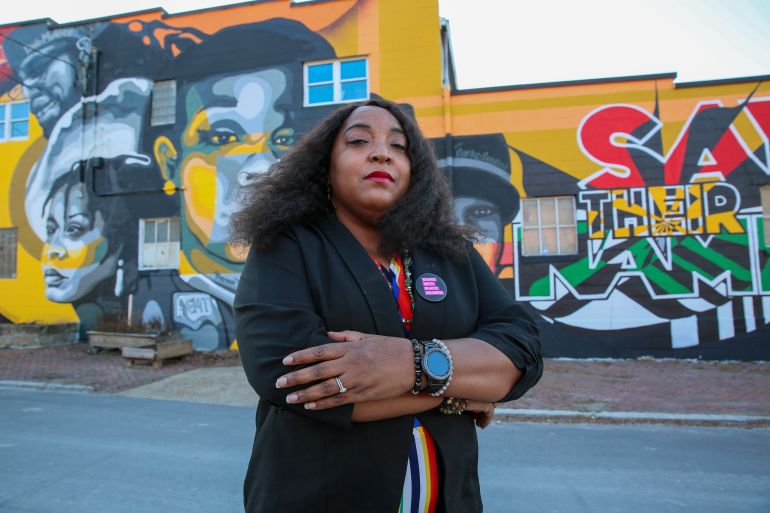
Louisville, Kentucky – Dozens of cars blared their horns as they rolled up on the north side of Kentucky’s state Capitol last week, one woman waving a Black Lives Matter flag from a truck bed.
“Whose law,” one protester yelled into a megaphone. “Breonna’s law,” the others chanted back.
Keep reading
list of 4 itemsUS: Two police officers fired over Breonna Taylor shooting
Officers involved in Breonna Taylor’s death facing dismissal
Police investigate after Breonna Taylor statue defaced in Oakland
It has been nearly a year since Breonna Taylor was killed by Louisville Metro Police in the early hours of March 13, 2020, in a botched raid.
Taylor’s mother, Tamika Palmer, huddled with the protesters who called on legislators to do more to enact police reforms.
After the police killing of George Floyd in May, Taylor’s name became a rallying cry during worldwide marches against systemic racism and police brutality throughout the summer and fall.
In Louisville, protesters took to the streets for more than 180 consecutive days, pressuring the city to pay $12m to Taylor’s family and agree to wide-ranging police reforms. But Palmer was pushing the state’s General Assembly to pass “Breonna’s Law”, a proposed statewide ban on no-knock warrants.
“It’s easy to say, yeah OK, we’re going to do all these things,” Palmer said. But so far, she said, “it’s fallen short.”
Calls for policy reforms such as a ban on “no-knock” police warrants are just one way Louisville’s Black community is pushing for change since Taylor’s death.
In neighbourhoods and halls of power, a cadre of Black women in Louisville is honouring Taylor’s legacy by giving back to their communities, just as Taylor, a hospital technician, did when she was alive.
They are running nonprofits that feed Black communities. They are seeding new businesses to rebuild Black wealth. They are pushing back on evictions and a cash bail system that disproportionately strands people of colour behind bars. They are leading the effort for legislative reforms. They are running for office. And the Breonna Taylor Foundation is developing education, youth and other initiatives.
The community efforts spearheaded by Black women is fitting given Taylor’s job. Prior to her death, Taylor’s mother worried her daughter would contract COVID-19 due to her work as an emergency room technician in two local area hospitals.
But the 26-year-old, who dreamed of being a nurse, brushed off the concerns, telling her family at the time, “I’ve got to do what I’ve got to do to help, and do my part.”
One year after her death, Al Jazeera spoke to five Black women in Louisville honouring Taylor by making a change in her hometown, with or without the establishment’s help.
Attica Scott and the fight to pass ‘Breonna’s Law’
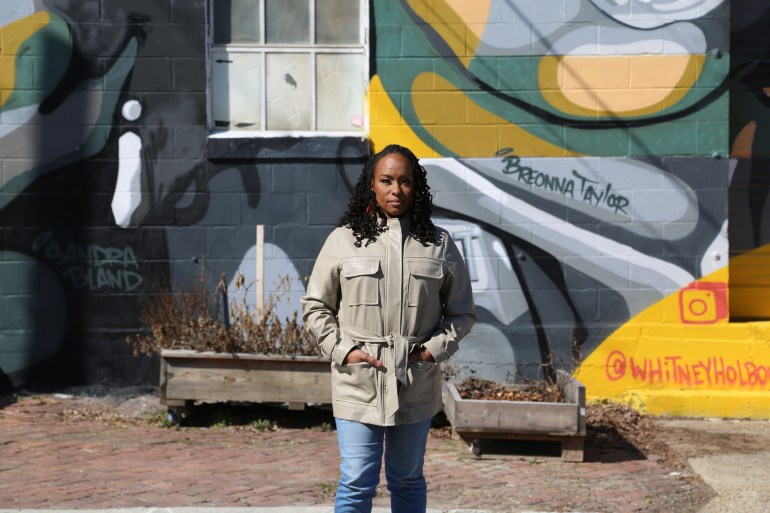
When Attica Scott first filed “Breonna’s Law” in August 2020, she was the only Black woman serving in the state’s 138-member legislature.
“As a mom of Black children, as a state legislator, as someone deeply rooted in the community, of course, it made sense for me to file this bill,” said Scott, now one of two Black female legislators in the state’s General Assembly.
Breonna’s Law, modelled off a Louisville ordinance under the same name, would ban all no-knock warrants, like the one used by police to raid Taylor’s home, and would require officers to wear activated body cameras before and after serving a warrant and submit to drug and alcohol testing if involved in a deadly incident. The piece of legislation is also the first bill to be named for a Black woman in Kentucky’s history, Scott said.
After learning that no officers would be directly charged for Taylor’s death, many protesters shifted their focus to advocating for Breonna’s Law. The bill was discussed by the state’s House Judiciary Committee this week, but it does not have enough time to make it through the legislative process before lawmakers adjourn at the end of this month.
Instead, leaders in the Republican-controlled statehouse are rallying around a different bill centred on no-knock warrants. That bill passed Kentucky’s Senate last month, and for Scott and protesters, it’s a first step, but it simply falls short. The Senate bill, not named for Taylor, would only limit the use of no-knock warrants. It was filed by Senate President Robert Stivers, who is white.
To have the president of the Senate when he presented the bill refuse to even say Breonna Taylor's name ... it was such a removal of her from even what got us here today.
Scott says the way the Senate bill has been presented has silenced her and other Black women who have been leading the calls for justice for Taylor over the last year.
“To have the president of the Senate when he presented the bill refuse to even say Breonna Taylor’s name … it was such a removal of her from even what got us here today,” Scott said.
“It wasn’t benevolence from a white saviour elected official, it was because Breonna Taylor was murdered,” she added. “People rose up and demanded justice, and you cannot continue to erase our work as Black women and think that we are going to be silent about that pain.”
It is that pain that, in part, continues to motivate Scott in her work. Last week, when Tamika Palmer briefly spoke to protesters who caravanned to the state capital for Breonna’s Law, Scott’s eyes met Palmer’s and she saw “the pain and hope” Taylor’s mother carries with her every day.
“That’s what I take away from this last year, I take away both pain and hope,” Scott said.
“All of the people who have shown up for racial justice, all of the 700 plus people who’ve been arrested, including myself and daughter who was a teenager at the time, all of the people who have taken on actual policy,” Scott added, “they have left me with this reminder that our protest includes policy and it includes politics.”
Scott says she is especially inspired by those involved in the movement for Black Lives who told her they plan to run for office in 2022. “That is what a movement is about. That is what building collective power is about,” she said. “And that is how we will get justice for Breonna Taylor.”
Shameka Parrish-Wright and the battle at the ballot box
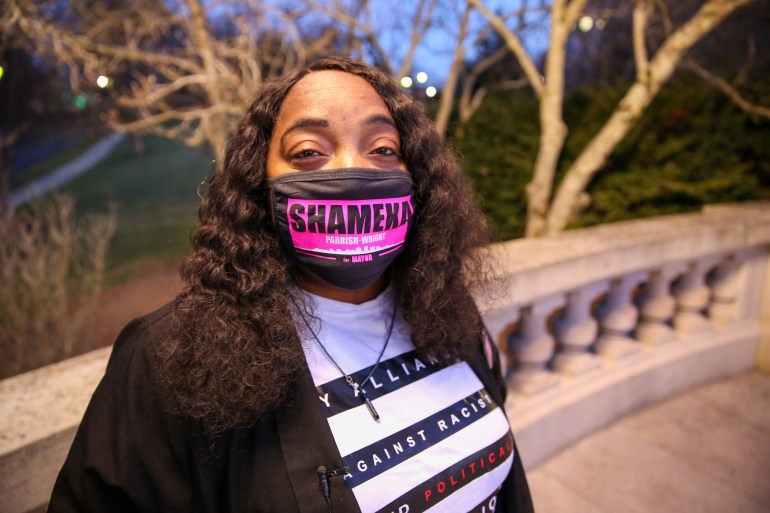
Shameka Parrish-Wright knew she would run for office one day, but she did not think it would be this soon.
The 44-year-old was in Atlanta, Georgia, last January with Attica Scott and their daughters door-knocking for Democratic candidates when she found out Louisville had picked its next police chief. The city was bringing in Erika Shields, who resigned as Atlanta’s top law enforcement officer last year following a police shooting of a Black man.
Parrish-Wright could not understand why Louisville would look to the outside when what the police department needed, she said, was someone who knew the city well and could identify with the people on the ground.
“That’s when I decided it’s going to take us to change things,” Parrish-Wright told Al Jazeera, just months after she announced her plans to run for Louisville mayor in 2022. “We have to have people who are willing to be elected and to bring the people’s agenda because [officials are] not listening to us.”
Like so many Black women, Parrish-Wright says she is already an unofficial mayor to her community, at work and at home.
“I’m always deciding, putting out fires, answering questions, seeing who should get what, when, where and how, making sure that I delegate and bring people to the table,” she said.
The co-chair of the Kentucky Alliance Against Racist and Political Repression and the operations manager for The Bail Project, Parrish-Wright has been at the forefront of the protests in Louisville, and the effort to get those arrested the legal help they need.
On a blazing day last September, Parrish-Wright, her eyes heavy from a night of no sleep, patiently talked to a slew of reporters under the beating sun. In between conversations, she inquired about a young protester, who had been arrested the night before. As her interviews wrapped up, Parrish-Wright urgently walked towards the Louisville Metro Department of Corrections to check on the protester who remained behind bars.
Just hours before, she herself had been released from jail after being arrested on charges that were later dropped. It is moments like these that young protesters have repeatedly told Al Jazeera make Parrish-Wright not only a protest leader, but mentor to so many.
For Parrish-Wright, it is the young people who have motivated her to continue the fight for justice for Breonna Taylor and Louisville’s Black community.
“The emergence of young leaders, feeling inspired and seeing the leaders in themselves,” is encouraging, Parrish-Wright said.
“Before they said activist revolutionaries don’t make good politicians. We’re turning that [notion] on its head,” she added. “Now, we get to diversify our leadership in a real way … And that’s because our young people are not accepting anything less. They want your words to match your actions and that inspires me.”
Nannie Grace Croney and the push for change
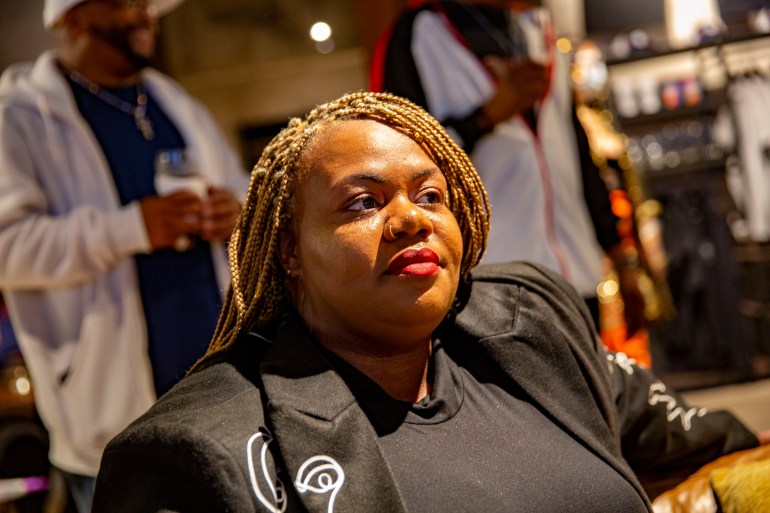
Nannie Grace Croney remembered the exact moment.
She was marching as Louisville was exploding with night-time street protests, overcome with tears and grief over the police killing of a Black woman who was the same age as Croney, 26.
“This was the time that everything had to change. It was now or never. It was a time in history we’d never seen,” she said. But after a couple of days of emotional marches that were often met with police tear gas, she decided, “I can’t do this. The front lines aren’t for me. But I can fight in other ways.”
Nearly a year later, Croney has put a social work career on hold to become the full-time deputy director of Change Today, Change Tomorrow, a nonprofit started by young Black women that serves the Black community’s food justice, education and public health needs.
The grassroots organisation has blossomed with an influx of donations and volunteers to employ eight staffers. In the last six months of 2020, the group served 65,000 people in Louisville’s predominantly Black West End.
Among their programmes is an initiative that gives underpaid educators school supplies. Another provides toiletries to the homeless and holiday gifts for children.
They also opened Pocket Change, a retail space to help Black-owned businesses sell goods and attend business workshops near one of Louisville’s top dining-and-shopping strips. An education centre offers mentoring, tutoring and space for preteens.
Croney said many Black women felt similarly compelled after protests seemed to mark a sea change both inside and outside her community amid an unprecedented wave of “so much passion, fight and urge for change.”
Breonna Taylor's legacy and life has impacted this city in ways I’ve never seen.
Change Today, Change Tomorrow has drawn money from some establishment funders, such as the Community Foundation of Louisville, who “are opening up dollars for racial justice, for organisations doing this necessary work”, she said.
But other foundations have been slow or reticent, which she attributes in part to a distrust of Black-led, Black-serving organisations, she said. “There’s still a lot of barriers into the nonprofit ecosystem for money.”
Croney is originally from Hopkinsville, on Kentucky’s western edge, where her mother and grandmother were known for community service. In Louisville, where she attended college, the needs rooted in past racist policies have long plagued the community.
The Taylor case brought a renewed spotlight on deeper issues such as racial disparities in generational wealth, which require a far longer game than do police procedural reforms.
“We’ve only begun to scratch the surface of what needs to happen,” she said. “When America gets the flu, Black America gets pneumonia. Everything that’s happened from the pandemic to the racial injustice and protests has further proved and intensified the needs.”
On a recent Saturday, she spent the afternoon handing out fresh eggs and bags of fresh produce for 100 people in the area, all bought from Black-owned farms.
The next night, she was in evening wear at her organisation’s event called Black Recharge, a celebration at a hip brewery that included a fashion show and pop-up vendors. She sipped water and said the last year had created a new momentum for the Black community.
“Breonna Taylor’s legacy and life has impacted this city in ways I’ve never seen,” she said. “As painful as her death was, it has been so powerful. It has caused such an awakening in Black people to know, this is the time. Let’s do this.”
Shauntrice Martin and the effort to #FeedTheWest
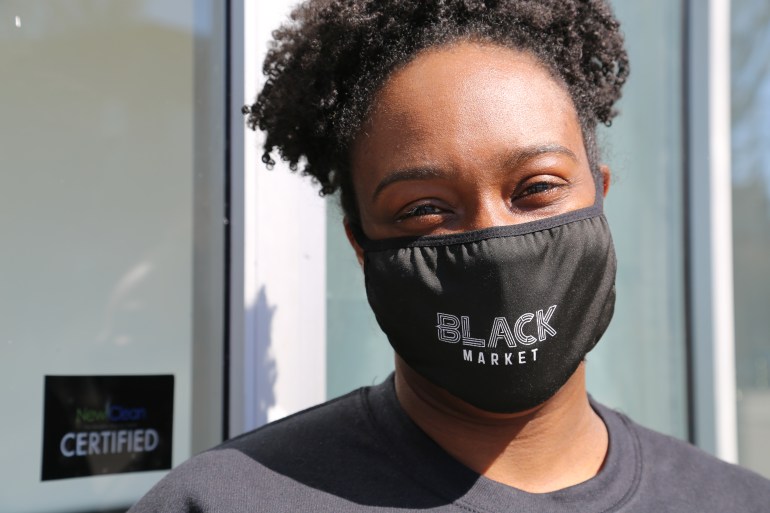
Shauntrice Martin was there to protest, but also to hand out food and other necessities to anyone in need. It was the morning of June 1, 2020, in Louisville’s West End. Hours earlier, before daylight broke, National Guard troops who descended on the area with Louisville police to enforce a 9pm curfew, killed David McAtee, the owner of YaYa’s BBQ, a popular food joint.
As the sun rose and protesters continued to gather, Martin noticed the local Kroger, a large chain grocery store, boarding up its windows and closing for the day.
“They didn’t announce it to anyone,” Martin, 36, recalled.
“A lot of our elders who were taking the city bus showed up [to get groceries],” she told Al Jazeera, noting that it was “blazing hot” outside. With no other large grocery stores within a reasonable distance and Kroger telling residents the store would be closed “indefinitely”, Martin feared many would have to go without groceries for days, if not longer.
With the help of friends, Martin immediately jumped into action, creating Google Forms so people could request grocery deliveries or sign up to volunteer and donate. By the time she woke up the next morning, she had hundreds of responses. “I thought I had been hacked,” she said. At that moment, #FeedTheWest was born.
Two days later, the neighbourhood Kroger reopened, but Martin says the need for #FeedTheWest did not go away.
Louisville’s West End, home to some of the state’s poorest areas, is a food desert, where residents find it especially hard to buy affordable, healthy food. These are the same areas that have a lower life expectancy and higher rates of diabetes, heart disease and other health conditions.
Martin is hoping to change that, however, through her work and the power of local residents. Since its launch, the #FeedTheWest programme, sponsored by Change Today, Change Tomorrow and Black Lives Matter – Louisville, has fed thousands of families and provided supplies like diapers, toilet paper and feminine hygiene products.
In January, Martin opened the first Black-owned grocery store in the city’s West End, the Black Market. While the Black Market is still building out its storefront, residents can order online for delivery or pickup or buy products at the store’s counter. The Black Market carries some of the typical products one would see at a health food store, but it also has shelves of inventory from Black-owned businesses, like teas, sauces and eggs. Its produce is sourced mostly from Black farmers in Kentucky.
As Martin reflects on the last year, she points to the need for lasting reform, like Breonna’s Law, but she is also focused on building sustainable ways for her community to live safer, healthier lives.
Martin wants to eventually open more grocery stores in the West End’s other neighbourhoods.
At the same time, the Black Market and #FeedTheWest will continue to help residents in need.
Last week, volunteers packed dozens of bags full of pears, oranges, potatoes and other fruits and vegetables to give away for free.
According to Martin, #FeedTheWest has handed out more than 100 bags and boxes of groceries every day in March to honour Taylor.
“She gave so much,” the Black Market recently tweeted. “We hope [to] do right by her memory.”
Chanelle Helm and the movement for Black lives
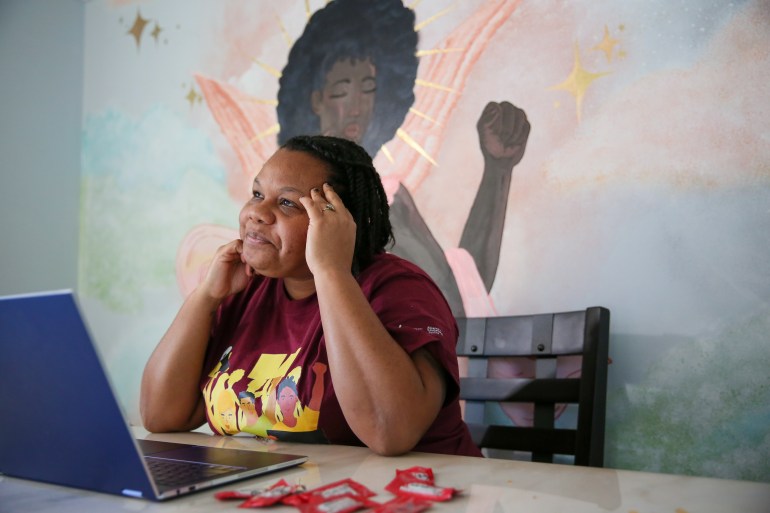
Chanelle Helm’s phone wouldn’t stop ringing.
She sat at a dining table at a farm property tucked near a suburban neighbourhood, holding a Zoom meeting and juggling calls, surrounded by notepads full of social justice organising plans.
“There are tonnes of things happening,” she said.
One of her children ran past in superhero pyjamas. Outside, a man acted as security for anyone pulling into the driveway – a place she chooses to work to help keep her safe from threats.
A year ago, the 40-year-old became one of the public faces of Louisville’s chapter of Black Lives Matter, a new global network born from the acquittal of the man who killed 17-year-old Trayvon Martin in 2013.
For Helm, who helped found the local chapter in 2016, any given day might mean talking to The Washington Post or GQ Magazine, ironing out a housing issue, or providing cash bail for a poor resident at the local jail.
“I get bombarded every morning with another emergency, something happening in the community, a mother trying to get their children out of prison,” she said, reflecting on 2020. “It’s been amazing, but it’s also been really hard.”
A year after Taylor’s death and protests that lasted several months, which included her being arrested at one demonstration, Helm is continuing to help spearhead the local Community Bail Fund.
It drew $3m in donations and has bailed more than 158 people languishing in jail because they cannot afford bail. They also work to get them housing, support and social services.
The work is Black liberation. Black communities are better served by making the change themselves, rather than waiting for the systems that were built to keep out Black people.
But now the BLM chapter is also housing residents in predominantly Black neighbourhoods facing evictions, providing pop-up meals and driving seniors to get coronavirus vaccines. They have bought properties to use for emergency shelter and for residents to learn skills like plumbing.
Their work has expanded with the help of volunteers and donations.
“Almost 300,000 people donated to us. That made us feel really good,” she said. “The work is Black liberation. Black communities are better served by making the change themselves, rather than waiting for the systems that were built to keep out Black people.”
Nationally, Black Lives Matter’s prominence has fuelled infighting over priorities, money and leadership structures. National polls show support for BLM slipped as 2020 went on but remained strong among Black Americans.
On this March Tuesday afternoon, with the high-profile anniversary of Breonna Taylor’s death ahead, she is not thinking about any of that. She is back on the phone, juggling issues of transgender justice and tenant rights, and planning an event in the square where protests continued throughout the year.
While in some ways she has taken on a public role she never sought, she said Black women making their own change in their communities is critical. And the goal, she said, is nothing short of changing how Black lives are lived in the US.
“People talk about reforms,” she said. “Small reforms don’t do s**t. We’re building something new. Because what’s missing wasn’t there in the first place.”
‘No stopping us’
As Louisville and the world marks the first anniversary of Breonna Taylor’s death on Saturday, her family and other high-profile activists are expected to speak and rally. A food distribution drive is also planned.
The women Al Jazeera spoke to were quick to point out that they are just a small handful of thousands of Black women who have been at the forefront of the movement for Black lives across the country.
They, like other women, are promising to continue to lead the fight for justice on the streets, in statehouses and in the neighbourhoods of the US’s marginalised communities.
“We’re going to continue to push,” Tamika Palmer, Taylor’s mother, told Al Jazeera.
Attica Scott thinks about Palmer and all the mothers who have shown up for justice.
“It is the message we’re sending to the world that you don’t take any of our daughters, and think that we’re going to be silent about it,” she said.
“We’re going to bring our daughters into this movement, into this calling and into work,” she added. “And when you bring your whole selves and you bring your family into this work there’s no stopping us.”